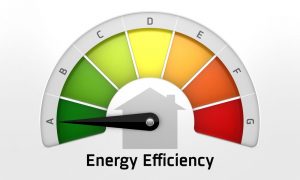If it is your desire to become more energy efficient, then the first step in the processes is to understand what energy efficiency is. Dictionary definitions vary greatly with some including convoluted explanations, however, one thing they all have in common is that energy efficiency reduces waste. From a dictionary’s perspective, energy efficiency, of any type, improves as waste is reduced. From a home’s energy efficiency perspective, the least amount of energy consumed to perform the same function is a definite improvement.
Being more energy efficient is having the ability to perform the same amount of work using less energy.
The ability for a car to transport the occupants twice as far for the same amount of fuel as another vehicle, translates into a vehicle that is twice as energy efficient as the other. I frequently use the metaphor, “how many miles to the gallon does your home get”?
Paying less per kilowatt hour for your electricity is a great idea however it does not improve your energy efficiency performance. Putting solar panels on your roof similarly does not improve your home’s energy efficiency either and neither does running an extension cord from your neighbour’s garage to fuel your air conditioners.
Becoming more energy efficient simply means applying the knowledge and strategies to get the same job done whilst consuming less energy. General functions that need to be performed around a home that we have come to expect include running a refrigerator, washing clothes and heating and cooling. If you have energy efficient appliances, then your energy consumption should be less for the tasks performed. There are however other ways of becoming more energy efficient. For example you may have the most efficient lighting devices in your home but if you leave them on 24 hours a day, seven days a week, then it is your behaviour that is not energy efficient and not your appliances. Having three fridges running in a home that could function well with only one is another example of wasted energy.
 Being energy efficiency in a home is not reliant on just one thing. The devil is always in the detail and this is more than likely why dictionary definitions may be convoluted. Other energy efficiency factors involve matching energy sources with function. That is, gas is a more efficient heat source than electricity however people elect to cook with electricity for convenience or safety or it may be the gas suppliers in a certain area are exceedingly expensive. The main objective of becoming more energy efficient is primarily to reduce expenses, so, very frequently, the cost and the ease of access to an energy source dictates supply. Put more simply, one energy source may well be more energy efficient than another, however it may be a much more expensive option and so is therefore not selected.
Being energy efficiency in a home is not reliant on just one thing. The devil is always in the detail and this is more than likely why dictionary definitions may be convoluted. Other energy efficiency factors involve matching energy sources with function. That is, gas is a more efficient heat source than electricity however people elect to cook with electricity for convenience or safety or it may be the gas suppliers in a certain area are exceedingly expensive. The main objective of becoming more energy efficient is primarily to reduce expenses, so, very frequently, the cost and the ease of access to an energy source dictates supply. Put more simply, one energy source may well be more energy efficient than another, however it may be a much more expensive option and so is therefore not selected.
In the big scheme of things, energy source expenses, convenience and safety of use are the major dictating factors in determining energy sources. To become more energy efficient you should not have to compromise lifestyle. Using a slow combustion stove or open fireplace to heat a dwelling in the wintertime is the choice of many. Some cities do not allow households to burn wood in their homes whilst in other locations wood or coal is either unavailable or too expensive to be a viable option. To become more energy efficient you need to reduce the amount of energy wasted. Only you know what changes you are prepared to make.
In many cities and towns around the world renters can make up as much as 50% of the market. Retrofitting homes for these people is not an option for the residence whereas a homeowner can make modifications resulting in saving as much as 40 percent of a home’s energy consumption merely by modifying simple physical characteristics of a home thereby reducing the necessity for excessive heating and cooling.
A quick summary of the features employed to reduce the waste in any hom e include the home’s design including it’s orientation relative to the path of the sun through the seasons, the appropriate location of building materials with high thermal mass, the type, size and positioning of windows and the use of insulation. The “star rating” of the electrical appliances predominately used within the home will also effect energy consumption as will the energy efficiency behaviours of all family members. Home owners can engage in retrofitting however there is little opportunity for renters to physically modify a home to decrease the households energy footprint, however, owners and renters equally have access to energy efficient appliances and positive behaviourally practices.
e include the home’s design including it’s orientation relative to the path of the sun through the seasons, the appropriate location of building materials with high thermal mass, the type, size and positioning of windows and the use of insulation. The “star rating” of the electrical appliances predominately used within the home will also effect energy consumption as will the energy efficiency behaviours of all family members. Home owners can engage in retrofitting however there is little opportunity for renters to physically modify a home to decrease the households energy footprint, however, owners and renters equally have access to energy efficient appliances and positive behaviourally practices.
There are however few houses within our community that are operating at maximum energy efficiency which means that generally speaking there is room for improvement in almost every home.
A thoughtful audit in any household has the potential to identify where improvements can be made which would result in reducing the home’s energy footprint thereby increasing efficiency and reducing energy costs.
Get your FREE copy of “Savvy Up and Save” here >>>LEARN MORE>>>
Moreton Bay residents can access weekly tips from John on Community Radio 101.5 FM Friday Mornings at 10:10am
John Lynn
